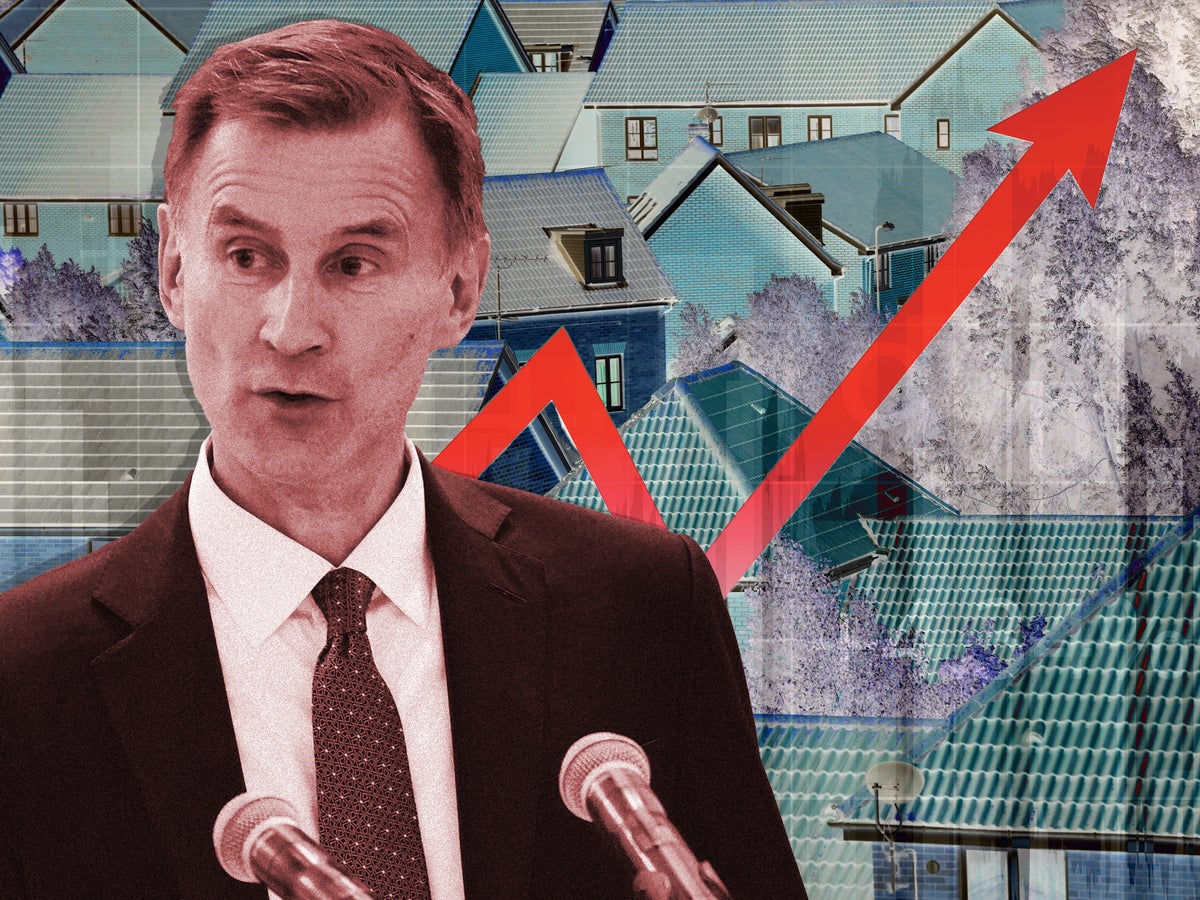
Soaring interest rates have caused household wealth in Britain to fall by more than £2 trillion over the past year – the biggest fall since the Second World War, a think tank has warned.
The Bank of England has engaged a rapid rate-rising cycle since late 2021 in a bid to tackle the inflation and restore order after Liz Truss government’s disastrous mini-Budget.
The rising base rate has caused mortgage rates to spike, house prices to fall and the price of government and corporate bonds to plummet.
As well as causing pain for homeowners, falling bond prices have reduced the measured value of pension assets, normally the biggest single source of household wealth in Britain.
New analysis by the Resolution Foundation suggests total household wealth had fallen to 650 per cent of national income in early 2023 – a £2.1 trillion cash fall over the past year, and the biggest fall as a share of GDP in the post-war era.
The Bank of England base rate currently stands at 5 per cent – but further rate rises are expected, with predictions the rate will go as high as 7 per cent next year in a bid to tame inflation.
Labour has accused Rishi Sunak and his chancellor Jeremy Hunt of failing to do enough to ease the “Tory mortgage bombshell”, with lenders’ average two-year fixed rate mortgage deal already edging close to 7 per cent.
Homeowners set to remortgage have been warned to prepare for a “huge” fall in disposable income after the Bank of England said interest rates could cost an extra £500 a month to 1 million borrowers by 2026.
However, the Resolution Foundation said rising interest rates could create some “winners” among the younger generations, including aspiring first-time buyers and pension savers.
Interest rates have put off some first-time buyers, but could create ‘winners’ in years ahead— (Copyright 2022 The Associated Press. All rights reserved)
The think tank argued that a “new normal” of higher rates could end a 40-year wealth boom that has been a key driver of intergenerational inequality.
Rising house prices have largely benefited older generations, while many younger people have been locked out of home ownership altogether, it said.
The foundation’s Peaked Interest? report – part of a partnership with the abrdn Financial Fairness Trust – looked at what higher rates could mean for living standards and wealth accumulation in the future.
Persistently higher interest rates could have two key long-term effects – lowering house prices and making it slightly easier to achieve a decent standard of living in retirement by raising rates of return on pension savings, the foundation said.
Although rising rates are squeezing mortgage holders – and cutting off some first-time buyers in the short term – falling house prices could benefit young people hoping to get on the ladder in the years ahead.
Bank of England governor has warned of mortgage pain ahead— (AP)
The deposit barrier for first-time buyers could be reduced. Back in the mid-1990s, it would have taken a typical young, first-time buyer/couple around eight years to save for a 10 per cent deposit on an average first-time home. This figure has risen to 14 years, but could potentially fall back to around 10 years, the foundation suggested.
While rising rates add to the cost of repaying mortgages, the foundation said this could be more than offset by a lower level of borrowing needed to buy a home, reducing the overall lifetime cost of property ownership for new buyers.
Looking at pensions, the foundation said that in the pre-pandemic world, a typical worker would need to save around £5,000 a year to achieve an income in retirement worth two-thirds of their income prior to retiring.
But with higher interest rates, the same worker would need to save around £3,000 to achieve that same standard of living in retirement, potentially making it easier for younger cohorts to save sufficiently to enjoy decent living standards in old age.
Researchers also noted that the current rate-rising cycle could be a “blip” in an ongoing long-term trend towards lower interest rates. In such a scenario, wealth could continue rising and reinforce, rather than reverse, generational strains, they argued.
Ian Mulheirn, research associate at the Resolution Foundation, said rapid interest rate rises appeared to have “ended” the wealth boom. “Those with significant mortgages will be hit by these major changes. But there are winners too from a shift to a world of higher rates and lower wealth.”
He added: “The future path of interest rates is very uncertain. The current surge could be a blip, or herald a new era for the UK. Either way, policymakers should focus more on whether and how to insulate households from wild swings in their fortunes from these forces well beyond their control.”
Mubin Haq, chief executive of abrdn Financial Fairness Trust, a charitable trust, said: "The short-term pain of higher interest rates for mortgage holders could also mean a longer-term gain for young people hoping to buy their own homes and saving for their pensions.”







